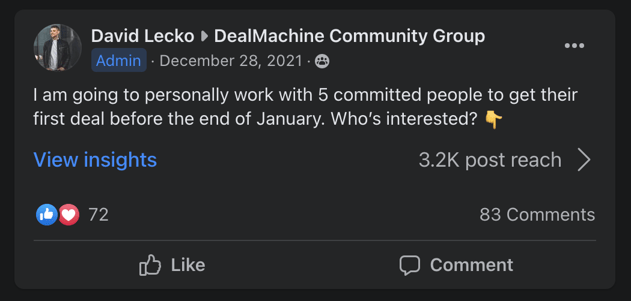
How to Go Driving for Dollars Like A PRO
.png)
Super excited today we're going to be actually driving for dollars with Mr. DealMachine himself, David Leko. We're going to be talking about what to look for, where to drive, and some other cool tips in between.
This is the transcript of the video above.
Elise: I wanted people to see how you started. How to drive for dollars, what are some tips and tricks?
David: Yeah, actually, when it started this house right here was one of the ones I added and four years later, it's still here.
Elise: Did you ever get in contact with them?
David: Oh yeah, he kind of shows up once every two months. Then he adds some paint, but he's just a very slow-moving guy.
That's why my first tip is, although this was like a perfect house right there, Don't get hung up on just that one house. You have to add a good amount of houses because this guy, for example, has not been ready to sell in four years. So you don't want to put all of your time and effort into one house just because it looks like the perfect house. You want to keep adding hundreds of properties.
I think that it was frustrating because I was coming into it kind of feeling like this is my house. I found this, but that's not the way you want to approach the conversation, instead you want to kind of come in with no expectations and just be curious about, how long he's had the house, what are his plans for it?
See if you can uncover a need or build a relationship so that maybe one day when he does want to sell it like he'll remember you and get in touch with you. It's honestly looking better right now than it did last month.
Elise: So where do people start driving for dollars? How would you choose where you're going?
David: Yeah, I think whenever you're first starting out, why don't you just explore right wherever you live.
The best deals that I've done have been homes that have been built 30, 40 years ago and have not been updated like a 500 square foot ranch. I just have had a lot of good luck with you in some of those types of deals.
They're not so old that the work required is ridiculous. They don't have crumbling brick foundations or a lot of old house problems. Because I'm building a rental portfolio, I like cookie-cutter houses. So you're not really surprised by stuff that needs to be repaired because they're all kind of the same.
This is a good one. Can you see this one? Paint chipping. I mean that one window is out of the actual frame, see?
Not every house in the neighborhood is totally rundown. There are nicer homes in the neighborhood, so it could be a good deal. There's room to make some profit if you fix it up.
Oh, wow, that is something else. OK, if you check out this house, look at that roof. It looks like Willy Wonka lives here. Yeah, this is perfect.
Somebody actually lives in the house, which I love. I really like boarded-up houses here and there. But honestly, I don't even get that excited about the boarded-up homes. If it's boarded up, it just means it's been boarded up for a long time, and they may not be super motivated to actually sell it all of a sudden. I mean, they took the time to actually board it up.
So I really like homes that look like that, where they're obviously less than the rest of the neighborhood.
Here's another one on the right, and I love not only the peeling paint and the fact that it just looks less appealing
than anything else, but the Window AC unit is also a really good indicator where most people in Indianapolis would have a central AC, but that obviously doesn't. So that just means the rest of the house hasn't been updated either.
When you're in doubt, just add it and move on. Don't worry too much. In fact, that's my second tip, don't worry too much about if it's the right house or not. If you're asking yourself, just add it and move on, it's going to cost $0.50 to send a piece of mail to it.
Here's another one that I would add too. Here's a small detail that you might not see. The window at the top in the attic is punched out. The porch is painted gray. There's a board in the front of it that has a big chip out of it.
Then if you look up under the roof there towards the front door, those pieces of wood are wavy and, one is not even painted. That's been replaced, but they didn't paint it.
Those are a few things that would tell me, just to add it, take a picture of it, and keep going....
I would add this one. I mean, they've done some nice things to it, like they have repaved their concrete and their bush is trimmed. So although it's old, it seems well cared for, you know? So I would add this one, but this wouldn't be the perfect one. If there's a neighborhood full of these, I wouldn't add any of them.
I'm just adding this one because it just hasn't been updated in the rest of the neighborhood has.
Check that out right there. There's some landscaping that hasn't been attended to, so that's a good indicator right there, as well as it just not looking quite as good as the rest of the neighborhood
Elise: Many people ask about creative financing, could you go into what kind of housing situation you would want to think about those options?
David: Well, you know, the creative financing strategy that you hear about the most is called subject to.
So what that means is if you have a house where they really want to sell it, they need to sell it, they need to get out of their house. Say it's worth $100,000 and they owe $100,000 on the mortgage.
So you can't do a wholesale deal. You can't buy that because, in order for them to get rid of the deal, you've got to pay $100,000. If you pay $100,000 that's what the house is worth.
So you don't have any room to do anything, you're not going to make a profit on that deal. So what you could do with that homeowner is you could say,
"Hey, you've locked in your mortgage, when the rates were better than they are right now, and there's not enough equity in the house for me to actually give you an offer that you could walk away with anything. So here's what I'm going to do. I will take over the house. You will keep the loan in your name. I will take over payments for the loan for you and then you rent it out.".
Let's say the payment on 100,000 dollar property is like $300 a month or something, and then you can rent it out for $600 a month.
That guy gets to walk away from his property, and he doesn't actually have any other obligations. You take over his payments, the loan still in his name, and the properties in your name, and then you rent it out and you make the difference between the rent and the loan payments.
That's one scenario where creative finance would help out is whenever wholesaling the deal or just buying it outright wouldn't make sense.
Tip three, if you see a handicap ramp that looks kind of aged and older like that, that's a reason to add a property for me.
Of course, it could be somebody with a lifelong disability, but more often than not, it's somebody that's actually probably maybe going to need to move into an assisted living place. By the time that people make those decisions, it's oftentimes the house has not been kept up for quite a while, and they need that cash to pay for the assisted living.
So those are ones that I always add, not when it's a new handicap ramp, but when the ramp looks fairly old.
I had that awkward conversation, somebody coming up to me while driving saying "What are you doing?". Then you have to figure out what to say. The right thing to say is, "Hey, I'm adding properties because I'm a real estate investor and I want to buy some of these properties straight up."
Here you go. Don't go in the yard, though there's a Beware of dog sign. This house is good because there is like biological growth on the awnings. Do you see that?
There are tags in the DealMachine app that you can tag what type of property you're adding and the growth is on there.
You can't call it mold unless it's been officially tested. So biological growth is safe.
In January, I made a post in the DealMachine Facebook group and I was like, I want to help five people get their first deal in January. It ended up having 83 comments. I was really excited. It was kind of difficult to pick who to actually select. But I did go through the comments and I kind of just picked the first five that would answer a call for me.

I looked up their phone numbers and called them. DealMachine skip tracing worked very well and we talked four times. It was 30 minutes every week.
The biggest takeaway for all of them that I felt was a big breakthrough was on the first call. Many of them had not realized that you need to add around 500 properties. I used that with all of them because I feel like, you know, the biggest struggle is individuals will get hung up on one particular property that they're like, "Oh, this is my property, right?" but no, you need to add a lot of properties.
That is basically the only thing you need to do, right? You don't need to set up a CRM. You don't need to design a custom piece of mail.
You just need to add properties and then you need to reach out to him. If you don't have enough time to cold call, you need to probably send direct mail. That way the people that call you are the ones who are kind of interested in responding and talking to you.
Also, if you don't like rejection, you need to probably send direct mail or something else because that way you're not dealing with, 100 rejections.
A lot of people, struggle with finding the time because they have families, they have W-2 jobs. We talked through that in each scenario about how much time do you have? How much budget do you have?
Direct mail is a little more expensive, but if you don't have the time you're going to need to allocate $250 to send mail to 500 properties. It's about $0.50 per house. We planned that out before we got too much further.
Randy, he's still adding hundreds of leads. He was doing 23 appointments per week in the second and third weeks. So I think he's going to get a deal, he's pretty close.
Then one of the other students was also fairly close. The other three, I don't know that they were able to consistently add the properties every week. Unfortunately, you can't get a deal unless you do the work of just adding the leads and getting in contact with the owner.
So I think maybe they'll come back to it in February if their situation changes a little bit. But I think two of the five are very close to getting a deal.
Elise: How do you feel about that?
David: I feel great. I'll feel even better when they do get the deal. We had a lot of wins to celebrate every week, and I think that was exciting for them and me. Just remembering to celebrate what you accomplish every week is what it's going to take to get to the finish line.
A lot of people quit too soon. it's heartbreaking because they've actually put in the work. They've maybe spent some money. If you quit too soon, all of it goes to waste. I think you've got to stick with it for at least three to six months
Elise: How long did it take you to get your first deal?
David: Well, I mean, I could have done it faster, I think it was six months. The big problem that I had was I was adding leads and I was having so much fun adding leads, but I never sent mail.
I was delaying sending the mail. I would have gotten the deal a lot faster if I had just sent the mail every time I added a property.
I was waiting because DealMachine didn't exist back then. There wasn't a way to send mail one-off at that time. I felt like the big "aha!" moment for me was, I drove by one of these properties, like a month or two later and somebody was working on it, and I felt that I missed out on that deal.
I looked up the property and somebody else had just bought it between the time I added it and then was driving by again. That's what motivated me to follow up immediately and keep following up every few weeks.
So there you go. There are tips for driving for dollars:
Plan on 500 leads at a minimum and then if you're going to send mail, budget $250 or if you're going to cold call, budget out how many hours it's going to take to call them and be honest about how much that's going to take so that you can commit to it and actually get it done.
Elise: You gave a lot of great tips on what to look for driving for dollars like the handicap ramp, the AC unit chipping paint, the biological growth. We learned that it's biological growth because unless it is told it is mold, it is not.
David: You folks get out there and add properties and send mail. I'll be watching.
Check out our free Real Estate Investing Ebook to set up your business for success
.png)
About Elise Knaack
Elise is the Head of Marketing at DealMachine. She manages all media to help our members learn more about real estate investing and how to use DealMachine to scale their business fast.



